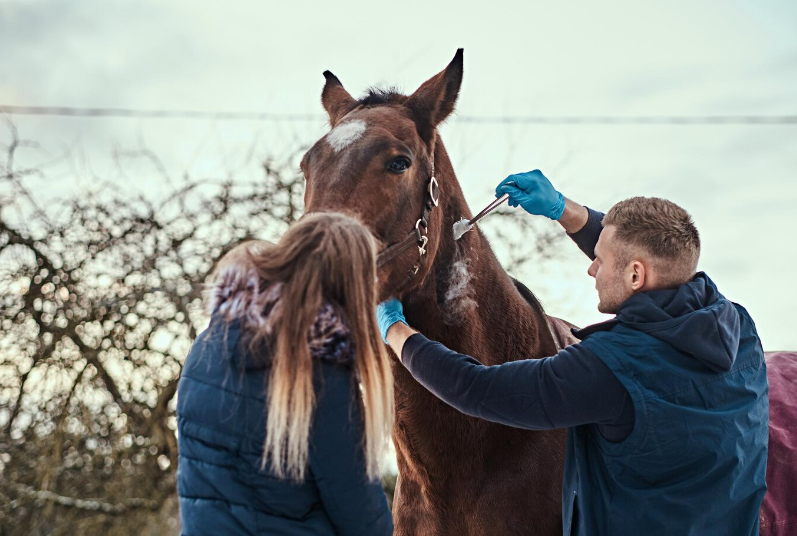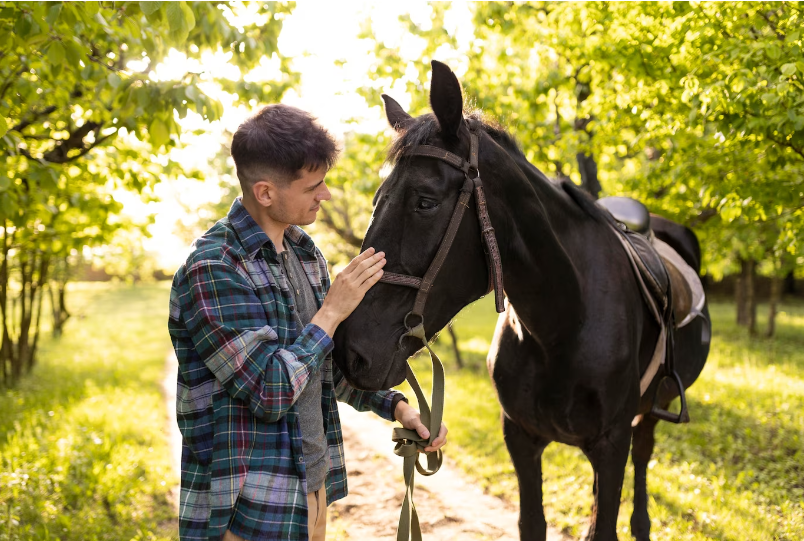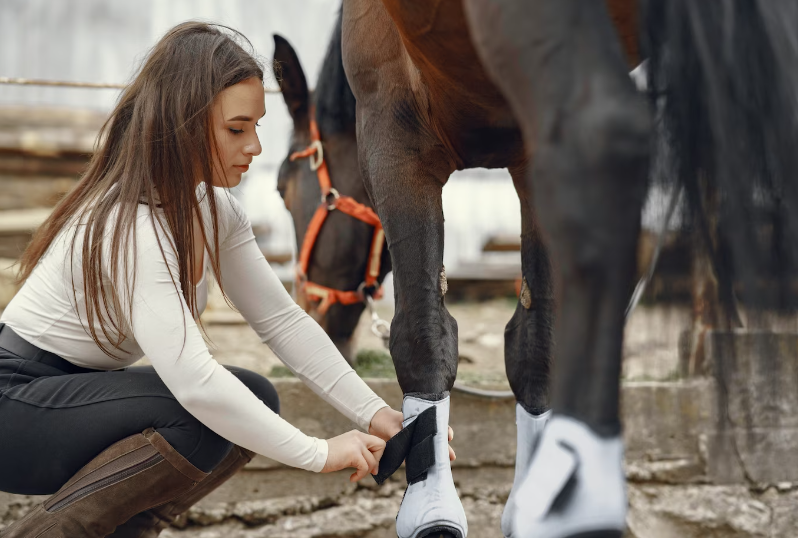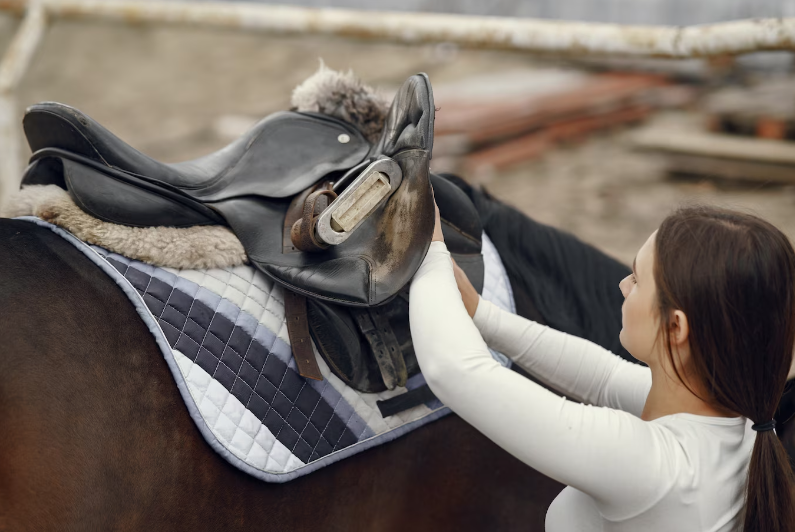Creating an Effective Conditioning Schedule for Your Horse’s Optimal Health

Creating a horse exercise routine is crucial for maintaining your equine companion’s health and well-being. A well-designed equine fitness plan can improve cardiovascular strength, enhance muscle development, and prevent injuries. To ensure your horse’s longevity and performance, it is essential to establish a horse conditioning schedule that addresses all aspects of their physical fitness.
Before developing a horse conditioning schedule, it’s important to consider your horse’s current fitness level and any specific goals you have in mind. Whether you’re preparing for a competition or simply want to keep your horse in optimal shape, tailoring the routine to their individual needs is vital. Consult with a veterinarian or an equine fitness professional to evaluate your horse’s condition and determine the appropriate level of activity for them.
When creating a horse conditioning schedule, consider a variety of exercises that target different muscle groups and enhance overall fitness. Incorporate exercises that focus on endurance, strength, flexibility, and coordination. This comprehensive approach will ensure that your horse is well-rounded in their physical abilities. Remember to gradually increase the intensity and duration of their workouts to avoid overexertion and injuries.
Content:
Understanding the Importance of Horse Health
Maintaining the health of your horse is essential for their overall well-being and performance. A horse exercise routine combined with a proper equine fitness plan is crucial in ensuring their physical and mental well-being.
Regular exercise helps to keep horses healthy by improving their cardiovascular fitness, strengthening their muscles, and maintaining a healthy weight. It also helps to prevent obesity and reduces the risk of various health issues such as lameness and respiratory problems.
In addition to exercise, a well-balanced diet and regular veterinary care are necessary for maintaining horse health. Feeding your horse high-quality forage and grain, along with providing access to clean water, will help to ensure they receive the essential nutrients they need to thrive. Regular dental check-ups and vaccinations are also important to keep your horse in optimal health.
Furthermore, it is crucial to monitor and manage your horse’s stress levels. Horses are sensitive animals and can become stressed in various situations. High-stress levels can lead to a weakened immune system and increased susceptibility to illnesses. Providing a calm and safe environment for your horse, a routine exercise schedule, and proper socialization can help to minimize stress and promote overall health.
Overall, understanding the importance of horse health is essential for any horse owner. By implementing a proper horse exercise routine, maintaining a balanced diet, and providing regular veterinary care, you can ensure the well-being of your equine companion and set them up for a long and healthy life.
Creating a Comprehensive Conditioning Schedule
A well-planned equine fitness plan is crucial for maintaining your horse’s health and performance. To create an effective horse exercise routine, it’s important to develop a horse conditioning schedule that incorporates a variety of exercises and gradually increases in intensity over time.
Setting Goals
Before developing your horse’s conditioning schedule, it’s important to establish clear goals. Consider the specific discipline or activities in which your horse will be participating and the level of fitness required for those activities. This will help you structure your horse’s exercise routine accordingly.
Designing the Schedule
Once you have identified your goals, you can begin designing your horse’s conditioning schedule. This involves determining the frequency, duration, and intensity of exercise sessions.
A general guideline is to aim for at least four to six exercise sessions per week, with each session lasting 30 to 60 minutes. Start with shorter sessions and gradually increase the duration over time.
When it comes to intensity, it’s important to strike a balance between challenging your horse and avoiding overexertion. Incorporate a mix of low-intensity steady-state exercise, such as long walks or light trotting, with higher-intensity interval training and occasional rest days.
Monitoring Progress
Regularly monitor your horse’s progress and make adjustments to the conditioning schedule as needed. Keep track of important parameters such as heart rate, respiratory rate, and recovery time after exercise. This will help you gauge your horse’s fitness level and ensure that you are progressing towards your goals in a safe and appropriate manner.
| Day | Exercise Type | Duration | Intensity |
|---|---|---|---|
| Monday | Long walk | 30 minutes | Low |
| Tuesday | Light trotting | 40 minutes | Medium |
| Wednesday | Rest day | – | – |
| Thursday | Interval training | 30 minutes | High |
| Friday | Low-intensity ride | 45 minutes | Low |
| Saturday | Interval training | 40 minutes | High |
| Sunday | Rest day | – | – |
Remember, every horse is different, so it’s important to tailor the conditioning schedule to your horse’s specific needs and abilities. Consulting with a veterinarian or equine fitness expert can provide valuable guidance and ensure that you are optimizing your horse’s health and performance.
Identifying Key Factors for Optimal Horse Health
Maintaining horse health is crucial for their overall well-being and performance. As horse owners, it is important to understand the key factors that contribute to the optimal health of our horses. This knowledge can help us develop a comprehensive horse conditioning schedule and exercise routine that promotes their fitness and longevity.
Proper Nutrition
One of the most important factors for maintaining horse health is providing a balanced diet. Horses require a combination of forage and concentrate to meet their nutritional needs. It is essential to provide them with high-quality hay or pasture for grazing along with the appropriate amount of grain or pelleted feed. Consulting with a veterinarian or equine nutritionist can help determine the specific dietary requirements for each individual horse.
Regular Veterinary Care
In addition to proper nutrition, regular veterinary care is essential for optimal horse health. Scheduling routine vaccinations, dental check-ups, and deworming treatments can help prevent common health issues. Regular veterinary examinations can also detect any potential problems early on, allowing for prompt treatment and prevention of further complications.
Exercise and Conditioning
Horse exercise plays a vital role in maintaining their overall health. A structured horse conditioning schedule will help build strength, endurance, and flexibility, ensuring that the horse is fit and ready for their specific activities, such as riding or competing. It is important to design an exercise routine that takes into account the horse’s age, breed, and physical capabilities. Gradually increasing the intensity and duration of exercise sessions will help prevent injuries and promote overall fitness.
In conclusion, maintaining horse health involves several key factors such as proper nutrition, regular veterinary care, and a well-planned exercise routine. By staying proactive in these areas, horse owners can ensure that their horses are healthy, happy, and performing at their best.
Determining the Right Workload for Your Horse
When it comes to maintaining horse health, it is crucial to establish a suitable horse exercise routine that includes a well-balanced horse conditioning schedule. The right workload for your horse will depend on various factors, including age, fitness level, and discipline.
Consider your horse’s age and fitness level
First and foremost, you should take into account your horse’s age and current fitness level when determining the workload. Younger horses or horses that are just starting their training may require a lighter workload to prevent injury and allow for proper growth and development. On the other hand, more experienced and fit horses can handle a more demanding workload.
Take your horse’s discipline into account
Each discipline requires different levels of fitness and conditioning. For example, a racehorse will need intense and frequent workouts to build stamina and speed, while a dressage horse may require more focus on suppling and collection exercises. Consider the specific demands of your horse’s discipline and tailor the workload accordingly.
It is important to remember that workload should be increased gradually to allow your horse’s body to adapt and avoid overexertion. Additionally, regularly assessing your horse’s overall health and condition will help you determine if the workload needs to be adjusted to maintain optimal performance and well-being.
Developing a Balanced Diet for Maximum Performance
Maintaining the overall health and well-being of your horse goes beyond just their exercise routine and conditioning schedule. A balanced diet plays a crucial role in maximizing their performance and ensuring their optimal functioning.
When developing a diet plan for your horse, it’s important to consider their individual needs and evaluate their current physical condition. Consulting with a veterinarian or equine nutritionist can provide valuable insights into what nutrients and feeding practices are best suited for your horse.
The diet should consist of a combination of forage, such as hay or pasture, and concentrates, such as grains or pellets. Forage provides essential fiber, while concentrates provide additional energy and nutrients. The ratio of forage to concentrates should be adjusted based on the horse’s activity level, body condition, and overall health.
It’s essential to ensure that the diet is well-balanced, providing all the necessary vitamins, minerals, and macronutrients. This can be achieved through the addition of a high-quality commercial feed, which is specially formulated to meet the nutritional needs of horses. The feed should be chosen based on the horse’s age, breed, workload, and any specific dietary requirements.
In addition to providing a balanced diet, it’s essential to establish a consistent feeding schedule. Horses thrive on routine, so feeding at the same times every day can help promote optimal digestion and nutrient absorption. It’s important to allow for ample grazing time, as horses are natural grazers and need access to forage throughout the day.
Monitoring your horse’s body condition regularly is crucial to ensure that their diet is adequately meeting their nutritional needs. Adjustments may need to be made based on their weight, muscle development, coat condition, and overall performance. Consulting with an equine professional can provide guidance in making these adjustments.
In conclusion, developing a balanced diet for your horse plays a vital role in maintaining their health and maximizing their performance. Taking into consideration their individual needs, providing a well-balanced combination of forage and concentrates, and establishing a consistent feeding schedule are key factors in promoting optimal horse health.
Incorporating Regular Veterinary Check-ups
Regular veterinary check-ups are a crucial component of your horse’s overall health and well-being. Just like humans, horses need regular medical attention to ensure they are healthy and fit for their intended activities.
When designing your horse exercise routine, it’s important to remember that each horse is unique and may have specific health needs that require the attention of a veterinarian. Regular check-ups allow for early detection and prevention of potential health issues, which can significantly impact the success of your equine fitness plan.
Benefits of Regular Veterinary Check-ups
By including regular veterinary visits in your horse conditioning schedule, you can benefit from:
- Early Detection of Health Issues: Regular check-ups allow veterinarians to catch any health issues early on, before they develop into more serious conditions. This can potentially save your horse from unnecessary pain and discomfort.
- Preventive Care: Through routine vaccinations, dental care, and deworming, veterinarians can help prevent common equine health issues and keep your horse in peak condition.
- Nutritional Guidance: Veterinarians can offer valuable advice on your horse’s diet and nutrition, ensuring they are receiving adequate nutrients to support their exercise routine.
- Performance Optimization: A veterinarian can assess your horse’s overall fitness and make recommendations on how to optimize their performance. They can provide guidance on appropriate exercises, training techniques, and conditioning strategies.
Choosing a Veterinarian
When selecting a veterinarian for your horse, it is important to find someone who is experienced in equine health and wellness. Look for a veterinarian who specializes in horses and has a good reputation within the equestrian community.
Additionally, it’s essential to establish a trusting relationship with your veterinarian. This will enable you to openly discuss any concerns or questions you may have about your horse’s health and receive accurate guidance and advice.
Incorporating regular veterinary check-ups into your horse’s overall health and fitness plan is crucial for their well-being. By taking a proactive approach to your horse’s health, you are setting them up for a lifetime of successful performance and overall wellness.
Implementing Proper Hoof Care Practices
Maintaining horse health goes beyond just following a regular horse exercise routine and equine fitness plan. One crucial aspect of horse care is proper hoof care practices. The health of a horse’s hooves significantly impacts their overall well-being and performance.
To ensure the health and strength of your horse’s hooves, it is essential to follow a regular hoof care routine. Here are some key practices to implement:
- Regular hoof trimming: Schedule regular visits from a qualified farrier to trim your horse’s hooves. Trimming helps maintain the proper hoof shape and prevents issues like overgrowth, cracks, and imbalances.
- Preventing bacterial and fungal infections: Keep your horse’s hooves clean and dry to prevent the development of infections. Regularly pick out debris and inspect the hooves for signs of infection, such as foul odor or discharge.
- Proper nutrition: A horse’s diet plays a vital role in hoof health. Ensure your horse receives a balanced diet rich in essential nutrients like biotin, zinc, and copper, which contribute to hoof strength and growth.
- Regular exercise: In addition to maintaining an equine fitness plan, regular exercise helps promote healthy blood circulation, which is crucial for hoof health. Exercise also aids in preventing conditions like laminitis and improves overall hoof strength.
- Appropriate hoof protection: Depending on the horse’s needs and lifestyle, consider using hoof boots, shoes, or pads to provide additional support and protection during activities like riding or turnout. Consult with a farrier or veterinarian to determine the best options for your horse.
By implementing these proper hoof care practices, you can ensure that your horse’s hooves remain healthy, strong, and resilient. Regular hoof care not only prevents discomfort and lameness but also contributes to your horse’s overall well-being and performance.
Establishing a Solid Dental Care Routine
As part of maintaining your horse’s overall health, it is essential to establish a solid dental care routine. Just like humans, horses require proper dental care to ensure their teeth stay healthy and functional. Neglecting their dental health can lead to a variety of issues that can affect their overall well-being.
Regular dental check-ups and teeth floating should be incorporated into your horse conditioning schedule, just like any other aspect of their health care routine. Dental issues can interfere with their ability to eat, which can impact their overall nutrition. It can also cause discomfort and pain, making it difficult for them to perform their horse exercise routine and negatively affecting their performance.
During dental check-ups, a veterinarian or equine dentist will examine your horse’s teeth to identify any abnormalities, such as sharp points, hooks, or uneven wear, which can lead to problems with chewing and bit acceptance. They will also check for signs of dental diseases, including gum inflammation, tooth decay, and infections. Just like humans, horses can get cavities and develop gum diseases that require treatment.
If any dental issues are identified during the check-up, the vet or dentist will perform teeth floating, which involves filing down any sharp edges or uneven wear on the teeth. This process ensures better chewing ability and helps prevent the development of dental problems in the future.
In addition to regular check-ups, there are a few things you can do to promote good dental health in your horse on a daily basis. Providing a diet that contains a proper ratio of forage to concentrate can help maintain dental health by encouraging natural chewing and saliva production. Chewing fibrous foods helps keep teeth naturally worn down and can help prevent sharp points and hooks from forming.
You can also supplement your horse’s diet with dental treats or toys designed to promote chewing and encourage saliva production. Chewing on these items can help remove plaque and tartar buildup and keep gums healthy.
Additionally, observing your horse’s eating habits can provide valuable insight into their dental health. If your horse shows signs of discomfort while eating, such as dropping feed or excessive salivation, it may be an indication of dental issues that require attention.
By establishing a solid dental care routine and incorporating regular dental check-ups into your horse’s overall health care, you can help ensure their teeth stay healthy and functional, allowing them to perform at their best. Remember, a healthy mouth is a vital part of maintaining horse health.
Maintaining a Clean and Comfortable Environment
Maintaining a clean and comfortable environment is paramount when it comes to optimizing your horse’s health. A dirty or unsanitary living space can lead to a variety of health issues and can significantly hinder your horse’s progress in their conditioning schedule and equine fitness plan.
Regular cleaning and maintenance of your horse’s stall or pasture is essential. Remove soiled bedding and manure daily to prevent the buildup of bacteria and potential disease. Be sure to provide fresh bedding on a regular basis to ensure your horse has a clean and comfortable place to rest and sleep.
Proper ventilation is also critical to maintaining a healthy environment for your horse. Adequate airflow helps prevent the growth of harmful bacteria and reduces the risk of respiratory issues. Consider installing fans or improving ventilation systems in your barn to ensure a constant flow of fresh air.
In addition to cleanliness, it’s important to create a comfortable environment for your horse. Provide ample space for them to move around and stretch their legs. Regular exercise outside of their conditioning schedule can greatly contribute to their overall fitness level and mental well-being.
Ensuring your horse has access to clean and fresh water at all times is essential for their health. Clean and replenish their water troughs regularly to prevent the growth of algae and the transmission of bacteria or parasites.
Finally, consider implementing a regular pest control routine to minimize the presence of flies, mosquitoes, and other pests that can irritate your horse and potentially transmit diseases.
By maintaining a clean and comfortable environment, you are not only optimizing your horse’s health but also creating an ideal atmosphere for them to thrive in their horse conditioning schedule and equine fitness plan.
Addressing Common Health Issues in Horses
When developing an equine fitness plan, it is important to consider not only the horse’s physical conditioning schedule but also their overall health and well-being. Maintaining horse health is crucial for their performance and longevity. In this section, we will discuss some common health issues that horses can face and how to address them.
One common health issue in horses is lameness. Lameness can be caused by various factors such as joint problems, tendon or ligament injuries, or hoof issues. It is important to regularly check a horse’s hooves for any signs of injury or infection and to address them promptly. In addition, ensuring proper hoof balance and trimming can help prevent lameness caused by uneven weight distribution.
Another health issue to address is gastric ulcers. Horses are prone to developing gastric ulcers due to their unique digestive system. Stress, poor diet, and intense exercise can contribute to the development of ulcers. To prevent gastric ulcers, it is important to provide horses with a low-stress environment, a balanced diet, and regular access to forage. Additionally, some veterinarians may prescribe medications to help treat or prevent ulcers.
Respiratory issues are also common in horses, especially those who are stabled or have limited access to fresh air. Dusty environments, poor ventilation, and exposure to allergens can all contribute to respiratory problems. To improve respiratory health, ensure that horses have access to clean air and provide dust-free bedding and forage. Regular turnout and exercise can also help keep their airways clear.
| Common Health Issues in Horses | Preventive Measures |
|---|---|
| Lameness | Regular hoof care, prompt treatment of injuries, proper hoof balance |
| Gastric Ulcers | Low-stress environment, balanced diet, regular forage access, medication if necessary |
| Respiratory Issues | Clean air, dust-free bedding and forage, regular turnout and exercise |
By addressing these common health issues in horses, you can ensure that your equine fitness plan is optimized for their overall well-being. Regular veterinary check-ups and consultations are also essential to detect and address any potential health problems early on. Remember, a healthy and happy horse is more likely to perform at their best!
Monitoring and Adjusting the Conditioning Schedule as Needed
Ensuring your horse’s health is a top priority when maintaining a horse conditioning schedule. Regularly monitoring your horse’s progress and adjusting the conditioning schedule as needed is crucial to their overall well-being and performance.
One key aspect of monitoring your horse’s condition is to keep a close eye on their body weight and muscle tone. If you notice that your horse is losing or gaining weight excessively, it may indicate that the current exercise routine is not suitable. Consulting with a veterinarian or equine nutritionist can help you determine if adjustments need to be made to their diet or exercise program.
Another important factor to consider is your horse’s energy levels and behavior during their exercise sessions. If you notice that your horse seems lethargic or disinterested, it may be a sign that they are overworked or fatigued. On the other hand, if they become overly excitable or agitated, it could indicate that they are not getting enough exercise or mental stimulation. Paying attention to these signs and adjusting the intensity or duration of their workouts can help keep them motivated and engaged.
Additionally, regularly assessing your horse’s overall soundness and lameness can help identify any potential issues that may need attention. If you notice any signs of lameness or discomfort during their exercise routine, it is important to address these concerns promptly. Adjusting the conditioning schedule to include more rest days or modifying the type of exercise can help prevent further injury and maintain their long-term health.
It is important to remember that every horse is unique, and what works for one may not work for another. By closely monitoring your horse’s progress and making adjustments as necessary, you can ensure that their conditioning schedule is tailored to their specific needs. Regularly consulting with equine professionals and observing your horse’s overall well-being will help you optimize their health and performance.
Q&A:
How often should I exercise my horse?
You should exercise your horse at least three to five times a week to maintain its health and conditioning.
What should be included in a comprehensive conditioning schedule for a horse?
A comprehensive conditioning schedule for a horse should include a combination of cardiovascular exercises, strength training, and stretching exercises.
How long should each exercise session be?
Each exercise session should ideally last between 30 minutes to an hour, depending on the horse’s fitness level and the intensity of the exercise.
What are some signs that my horse is overexerted or fatigued?
Some signs that your horse may be overexerted or fatigued include excessive sweating, rapid breathing, stumbling, and a decreased willingness to perform.
How can I prevent injuries while exercising my horse?
To prevent injuries while exercising your horse, it is important to warm up and cool down properly, use proper equipment and protective gear, and gradually increase the intensity and duration of the exercise over time.


